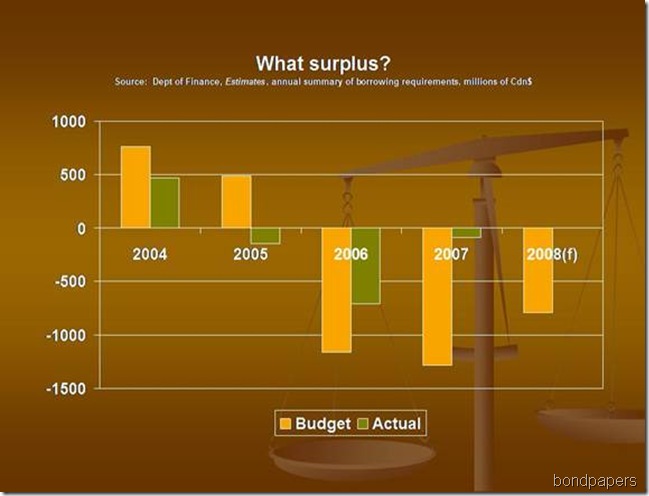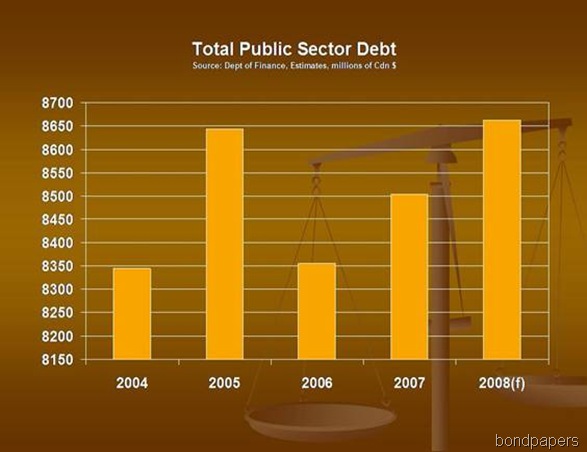If crude oil averages US$87 per barrel through the current fiscal year (ending 31 March 2009) and the government performs exactly as budgeted in every other respect too, the provincial government will wind up with a deficit of more than $794 million this year.
That's right.
Almost eight hundred million dollars in the hole.
It's not a state secret.
Your humble e-scribbler did not have to go through any contortions - mental or otherwise - to figure it out.
The figures are there, in black and white, in the provincial government's current budget. Hidden in plain sight, you might say.
But no, some of you are saying, the provincial government is forecasting a surplus of a half a billion dollars. The media reported it in April and they've kept saying it so it must be true.
Yes, the did and they have.
 But that isn't the official budget of the provincial government approved in the House of Assembly any more than all the talk by politicians about surpluses the past few years was accurate either.
But that isn't the official budget of the provincial government approved in the House of Assembly any more than all the talk by politicians about surpluses the past few years was accurate either.
That forecast was done separately by the department of finance and repeated by the finance minister countless times. It is based - evidently - on the hope that oil would actually spend most of the year well north of US$87. They were hoping on oil revenues being almost double the $1.7 billion used to make up the budget. An extra $1.3 billion would wipe out the forecast deficit and leave another $500 million or so besides.
The recent drop in oil prices below US$100 could throw that hope out the window, coming as it does a little less than half way through the fiscal year. Oil would have to drop quite a bit further than its current price in the mid nineties to wipe the anticipated surplus out entirely, but don't count on there being too much cash left in the till next April.
There are a couple of reasons for that beyond the drop in revenues compared to the Atlantic City dice roll projections.
For starters, if revenues are already up by about $800 million or so, government might be able to bring in something close to a balanced budget. Any less than that and something's gotta give to stay in the black.
The other thing is that - contrary to the popular view - government hasn't actually produced a real surplus in three years. Again, eyes are rolling, but all you have to do to see the truth is look at the government's annual financial statements.
Last year, for example, the government spent every nickel it originally budgeted, every penny of the $1.5 billion surplus and on top of that had to borrow another $88 million just to make ends meet.
Just to make it really plain, that table above is taken from a Bond Papers post last June that lays the whole thing out in a picture.
This administration, like pretty well all the ones before, likes to spend public cash. If there isn't enough coming in, hitting up the banks is just as good as money earned in other ways.
As the Auditor General pointed out in his report earlier this year, the provincial government has consistently boosted public spending based on the mountains of oil cash flowing.
They've built the province's spending on some pretty shaky ground, namely highly volatile commodity prices.
 At the same time, very little attention has been paid to paying down the large amount of debt - the accumulated deficits - that now runs upwards of $8.5 billion and is expected to climb higher this year.
At the same time, very little attention has been paid to paying down the large amount of debt - the accumulated deficits - that now runs upwards of $8.5 billion and is expected to climb higher this year.
That's the table at right, with the figures taken from the finance department's budget document, The Estimates.
For those of you whose mind has not just boggled into the "off" position, this has some pretty significant implications for what is going on in the province.
The province's finance minister told reporters today that salary expectations from groups like the nurses are based on high oil prices.
No, they aren't.
High public expectations for new spending and public sector union salary demands are based on the government hype about its own financial plans and its own cash flows. The people of the province believed all the stuff about surpluses and happy days finally being here. They believed because that is what they were told by politicians.
People have even been lulled into believing that the Hebron project - all $28 supposed billion of it - is coming right along any day now.
The reality is starkly different.
Oil revenues will decline over the next decade because of dwindling production and prices that are returning to something approaching the norm. The three existing fields will be well on the way to shutting down by the time Hebron gets into production.
Rather than adding to current cash flows - as most people likely believe - Hebron will simply take up some of the slack from that dwindling production. If construction starts on Hebron in 2012, the cash from its oil won't hit provincial coffers until about a decade from now.
The reality is that the next decade is going to be considerably more difficult than people imagined; difficult that is for the provincial government. They have made a rod to beat their own backs by creating a climate of expectations that simply can't be met with likely revenues. At the same time - through the energy corporation and the equity stakes - they've committed to a steady stream of new government borrowing over and above what it may cost to sustain the existing spending levels after the oil money drops off.
There's nothing overly complicated about the whole business. The information is readily available to anyone who cares to look.
Understanding what is going on today and what looks very likely to happen?
Well, that's as easy as A-B-C.
-srbp-